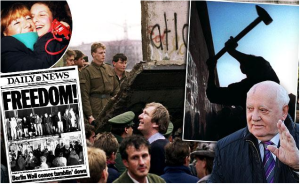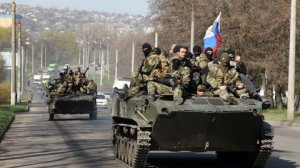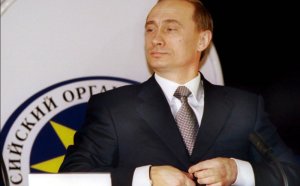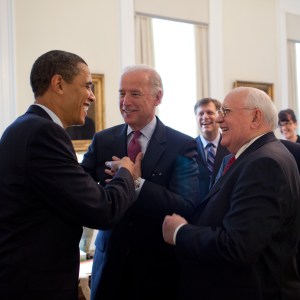 Evidently, many people were seized with shock and dismay yesterday as they listened to former Soviet President Mikhail Gorbachev deliver his keynote speech at a forum marking the 25th anniversary of the fall of the Berlin Wall.
Evidently, many people were seized with shock and dismay yesterday as they listened to former Soviet President Mikhail Gorbachev deliver his keynote speech at a forum marking the 25th anniversary of the fall of the Berlin Wall.
The Germans invited him, of course, because he played such a pivotal role in facilitating the peaceful reunification of Germany after the fall. But this is precisely why they might’ve expected Gorbachev to use the occasion to urge Vladimir Putin and Barack Obama to emulate the statesmanship he and George H. W. Bush Sr. demonstrated back then to facilitate the peaceful reunification of Ukraine today.
Instead, Gorbachev delivered an anti-Western diatribe that one could be forgiven for thinking was written by Putin himself. He seemed primarily interested in chastising the West for dancing on the grave of the Soviet Union, ignoring the inconvenient truth that his Glasnost and Perestroika policies did more than anything else to bury it:
The world is on the brink of a new Cold War…
Euphoria and triumphalism went to the heads of Western leaders. Taking advantage of Russia’s weakening and the lack of a counterweight, they claimed monopoly leadership and domination in the world, refusing to heed words of caution from many of those present here.
The events of the past few months [in Ukraine] are consequences of short-sighted policies, of seeking to impose one’s will and faits accomplis while ignoring the interests of one’s partners.
(Huffington Post, November 8, 2014)
Except that Gorbachev blaming the West for stoking tensions that could lead to Cold War II, is rather like former German President Paul von Hindenburg (1925–34) blaming the Allied countries for stoking tensions that led to World War II.
 But nothing betrayed what a propaganda hit piece this was quite like his conspicuous refusal to mention Crimea once in the 2,305 words he delivered. After all, what most defines “the events of the past few months” is Russia imposing its will and faits accomplis to annex Crimea and foment pro-Russian secessionism in Eastern Ukraine, ignoring treaty obligations it entered into with Ukraine and the United States to respect that country’s sovereignty.
But nothing betrayed what a propaganda hit piece this was quite like his conspicuous refusal to mention Crimea once in the 2,305 words he delivered. After all, what most defines “the events of the past few months” is Russia imposing its will and faits accomplis to annex Crimea and foment pro-Russian secessionism in Eastern Ukraine, ignoring treaty obligations it entered into with Ukraine and the United States to respect that country’s sovereignty.
Mind you, I’m on record criticizing the West for many of the geopolitical grievances Gorbachev cited … from what is so plainly Putin’s neo-Stalinist perspective. Most notably, given the disbandment of the Soviet-led Warsaw Pact, I thought it smacked of rubbing defeat in the face for the U.S.-led NATO to not only remain in force, but also enlist so many members of that old Pact into its ranks.
I also warned (in commentaries like “Catalonia: Spain’s Kosovo Problem,” October 1, 2012) that the adhesive way the West facilitated Kosovo’s breakaway from Serbia (in 2008) would set an untenable precedent. Sure enough, Russia cited that very precedent for the adhesive way it facilitated South Ossetia and Abkhazia’s breakaway from Georgia (just months later), and Crimea’s from Ukraine (earlier this year).
Not to mention the untenable precedents the United States set by leading coalitions of the willing (to do its bidding) on military misadventures everywhere from Iraq to Libya and Syria. Imagine the outrage in the West if Russia had done the same. Indeed, this scenario compelled me to float the argument that “Putin Took Crimea More Out of Resentment and Fear than Imperial Ambition,” March 24, 2014.
 This is why my criticisms of Russia have stemmed, foremost, from the brazen steps Putin has taken to roll back all of the democratic freedoms Gorbachev himself implemented; and only secondarily, from the very measured steps he has taken to reconstitute as much of the old Soviet Union as possible.
This is why my criticisms of Russia have stemmed, foremost, from the brazen steps Putin has taken to roll back all of the democratic freedoms Gorbachev himself implemented; and only secondarily, from the very measured steps he has taken to reconstitute as much of the old Soviet Union as possible.
I coined the term ‘putinization’ to describe Putin’s neo-Stalinist tactics, which were (and are) clearly aimed at neutralizing all political dissent, quashing all civil liberties, and making him a latter-day Czar.
(“Hail Putin,” The iPINIONS Journal, December 3, 2007)
Incidentally, with all due respect to Gorbachev, the steps Putin took in this latter case constrained me almost 10 years ago to declare that “the world is on the brink of a new Cold War,” which tit-for-tat sanctions between the West and Russia over Ukraine prove is already full blown. What’s more, instead of whining about NATO expansion, Gorbachev should have acknowledged that Putin’s military expansion into Ukraine has only justified the fears that compelled so many former republics of the Soviet Union to seek the protection (from Russia) that NATO membership guarantees.
Beyond this, I refer you to related commentaries – dating as far back as “President Putin Reforming Russia in His Own Image,” March 25, 2005, through “Cold War Redux: Friendship Over between Russia and the United States,” May 5, 2006, and “The Putinization of Russia Extends to Georgia,” November 2, 2006, to as recently as “Hello1937 – Putin Turning Russia Back to Stalin Days,” June 13, 2012, and “Int’l Court Declares Putin a Liar and a Thief,” July 29, 2014, to name just a few.
Interestingly enough, Gorbachev himself is on record decrying Putin for taking Russia back to the future. Here, for example, is how the March 6, 2009, edition of CBS News characterized his views:
In some of his strongest criticism of his successors, Mikhail Gorbachev has likened Vladimir Putin’s United Russia party to the worst of the communists he once led and helped bring down, and said Russia is today a country where the parliament and the judiciary are not fully free.
This is why so many were utterly stupefied that he was speaking in Berlin yesterday more as a Putin apologist than as the only Soviet leader the West thought they could do business with. But I knew better.
After all, what few political pundits, let alone ordinary Westerners, seem to know is that, even though he intended his Glasnost and Perestroika policies to introduce democratic freedoms, Gorbachev never imagined they would lead to the breakup of the Soviet Union. Moreover, even as he was criticizing Putin for systematically rolling back those policies at home, he was applauding him for reestablishing Russia’s Cold War sphere of influence throughout the former republics of the Soviet Union (aka the near abroad).
Never mind that having to resort to military force to win friends and influence neighbors makes Russia look more like a pathetic regional bully (akin to North Korea with more nukes) than a respected global power in league with the likes of China and the United States. Or that the reputation Putin has manufactured as a strong leader is belied by the fact that, but for the Soviet-era nukes he commands, he’d be no stronger than the tin-pot dictators who lorded over kleptocracies throughout post-colonial Africa.
But here is what is perhaps the most interesting point of all:
 Putin is on record damning the breakup of the Soviet Union as the greatest catastrophe of the twentieth century (notwithstanding two world wars, and far too many genocides). Therefore, it’s hardly surprising that Gorbachev is regarded in Putin’s Russia with about as much esteem as Benedict Arnold is in the United States.
Putin is on record damning the breakup of the Soviet Union as the greatest catastrophe of the twentieth century (notwithstanding two world wars, and far too many genocides). Therefore, it’s hardly surprising that Gorbachev is regarded in Putin’s Russia with about as much esteem as Benedict Arnold is in the United States.
Hence, it might just be that delivering this anti-Western speech was his way of attempting to redeem himself, if not his legacy, in the eyes of his Putinized compatriots. For only this explains why an erstwhile statesman like Gorbachev would so willfully play the role of skunk at Germany’s national celebration this weekend.
If you think about it, this is rather like former British Prime Minster Tony Blair – who played a pivotal role in brokering peace between Catholics and Protestants in Northern Ireland – being invited to speak at an anniversary celebration of the 1998 Good Friday Agreement and delivering an anti-German diatribe about Germany flexing economic muscles in Europe, the way it once flexed military muscles, in ways that threaten to blow the EU asunder. Got that? In other words, just as peace in Northern Ireland has nothing to do with growing dissension in the EU, the fall of the Berlin Wall has nothing to do with growing tensions between the West and Russia.
In any event, I suspect Gorbachev will find no redemption at home, and the welcome mats that once greeted him throughout the West will now be few and far between.
Related commentaries:
Putin reforming Russia…
Putinization of Russian extends to Georgia
Hello1937…
Int’l court…
* This commentary was originally published yesterday, Sunday, at 12:31 p.m.